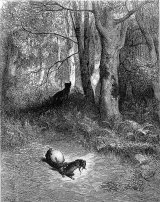The Two Rats, the Fox, and the Egg Page #2
The Two Rats, the Fox, and the Egg is a fable by Jean de La Fontaine which revolves around the story of two rats who find an egg and decide to roll it all the way back to their nest. However, on their way, they encounter a fox who cleverly tricks them into losing their found treasure. The story exemplifies themes of greed and deception and teaches the reader about the dangers of being overly trusting and not thinking wisely.
Genre: Fable
Genre: Fable
- Year:
- 1668
- 14 Views
That all their minds corporeal are; That building houses, making war, They are but agents, weak and blind, Of some mere watchspring in the mind. The object which their sense attacks, Returning, fills its former tracks, And straightway, in their bestial pates, The image seen before creates, Without that thought, or sense, or soul Have o'er the thing the least control. But men a different station fill, And, scorning instinct, use their will. I speak, I walk, and feel within Something to God-like power akin. Distinct from all my flesh and bone, It lives a life that's all its own, Yet o'er my flesh it rules alone. But how can soul be understood By what is merely flesh and blood? There lies the point. The tool by hand is guided; Who guides the hand has not yet been decided. Ah! what is that strange power which wings The planets on their heavenly way? Doth each some angel lord obey? And are my spirit's secret springs Moved and controlled the selfsame way? My soul obeys some influence; I know not what it is, nor whence. That secret must for ever lie Hid by God's awful majesty. Descartes knew just as much as I: In other things he may supplant All men; he's here as ignorant. But, Iris, this, at least, I know,-- That no such lofty souls endow The beasts of whom I've made example:-- Of soul, man only is the temple. Yet must we to the beasts accord Some sense the plant-world can't afford; And even plants have humble lives. But let me add one story still; And let me know how much your skill Of moral from its facts derives. Two Rats, seeking something to eat, found an Egg: For such folks, to have something to eat is sufficient; And seldom or never you'll find that they beg Of the gods turtle soup, or a French cook proficient. Full of appetite, nimbly they sat down to eat, And soon from the shell would have drawn out the meat, When a Fox in the distance appeared, to molest them, And a question arose, which most greatly distress'd them,-- No other, as you may suppose, but the way The Egg from Sir Reynard's keen snout to convey. To drag it behind them, or roll it on floor, To pack it behind them, or shove it before, Were the plans tried in turn, but were all tried in vain. When at length the old mother of arts[1] made it plain That, if one on his back held the Egg in his paw, The other from danger could readily draw. The plan was successful, in spite of some jolting; And we leave the two sages their pleasant meal bolting. Who shall, after this, declare That beasts devoid of reason are? For my part, I'll to beasts allow The sense that dwells in childhood's brow. Reason, from childhood's earliest years, In all its acts and ways appears; And so it seems to me quite plain That without soul there may be brain. I give to beasts a sort of mind, Compared to ours, a league behind. Some matter I would subtilise, Some matter hard to analyse, Some atoms essence, light's extract; Fire, subtlest of all things; in fact,
Translation
Translate and read this book in other languages:
Select another language:
- - Select -
- 简体中文 (Chinese - Simplified)
- 繁體中文 (Chinese - Traditional)
- Español (Spanish)
- Esperanto (Esperanto)
- 日本語 (Japanese)
- Português (Portuguese)
- Deutsch (German)
- العربية (Arabic)
- Français (French)
- Русский (Russian)
- ಕನ್ನಡ (Kannada)
- 한국어 (Korean)
- עברית (Hebrew)
- Gaeilge (Irish)
- Українська (Ukrainian)
- اردو (Urdu)
- Magyar (Hungarian)
- मानक हिन्दी (Hindi)
- Indonesia (Indonesian)
- Italiano (Italian)
- தமிழ் (Tamil)
- Türkçe (Turkish)
- తెలుగు (Telugu)
- ภาษาไทย (Thai)
- Tiếng Việt (Vietnamese)
- Čeština (Czech)
- Polski (Polish)
- Bahasa Indonesia (Indonesian)
- Românește (Romanian)
- Nederlands (Dutch)
- Ελληνικά (Greek)
- Latinum (Latin)
- Svenska (Swedish)
- Dansk (Danish)
- Suomi (Finnish)
- فارسی (Persian)
- ייִדיש (Yiddish)
- հայերեն (Armenian)
- Norsk (Norwegian)
- English (English)
Citation
Use the citation below to add this book to your bibliography:
Style:MLAChicagoAPA
"The Two Rats, the Fox, and the Egg Books." Literature.com. STANDS4 LLC, 2024. Web. 21 May 2024. <https://www.literature.com/book/the_two_rats%2C_the_fox%2C_and_the_egg_2645>.




Discuss this The Two Rats, the Fox, and the Egg book with the community:
Report Comment
We're doing our best to make sure our content is useful, accurate and safe.
If by any chance you spot an inappropriate comment while navigating through our website please use this form to let us know, and we'll take care of it shortly.
Attachment
You need to be logged in to favorite.
Log In